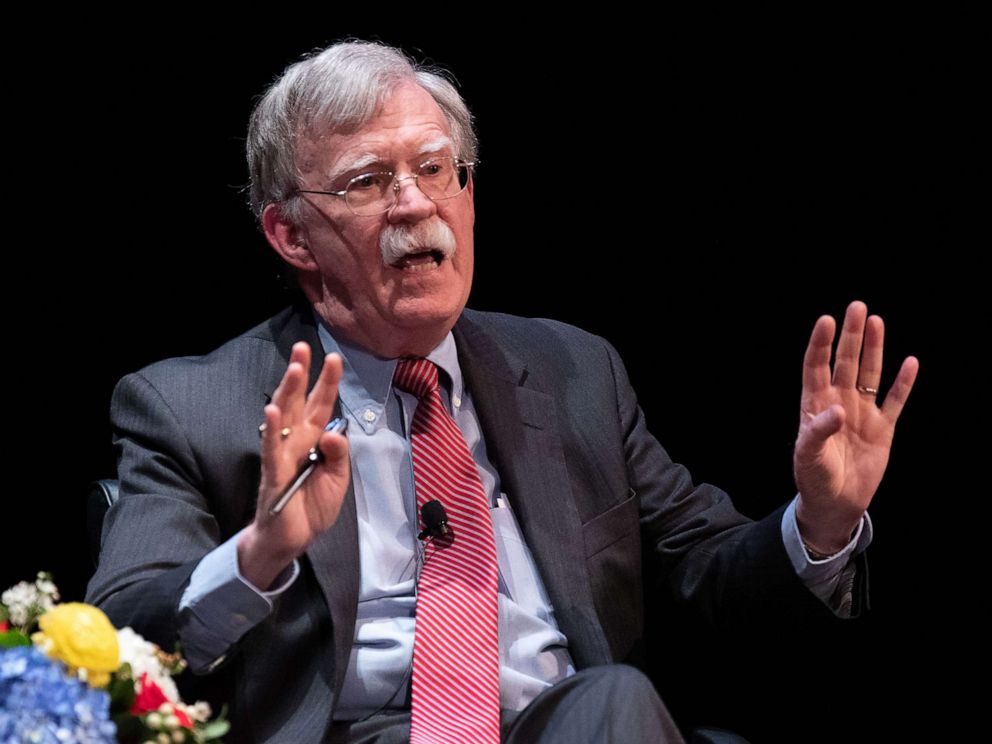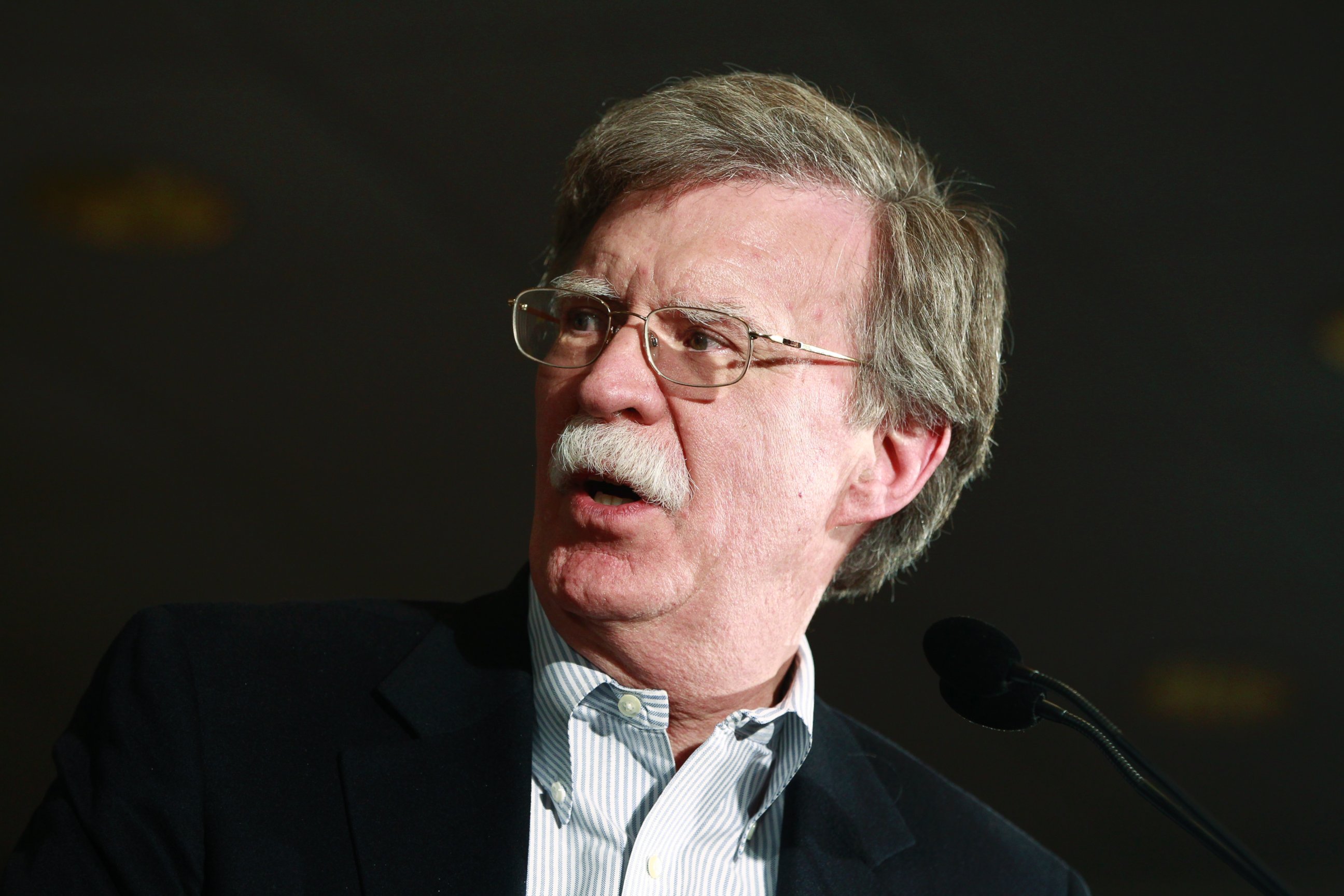Everything you need to know about John Bolton, Trump's former national security adviser
Bolton talked exclusively to ABC about his new book on his White House tenure.
John Bolton, President Donald Trump's third and longest-serving national security adviser, is speaking out against his former boss in a bombshell new book about his 17 months at the White House and an exclusive interview with ABC News.
A veteran of the past three Republican administrations, Bolton is a well-known and active voice in Republican foreign policy circles who has advocated for hard-line, militaristic positions on North Korea, Iran, Venezuela and other countries.
At times during his tenure in the Trump White House, that appeared to put him at odds with Trump the deal-maker. But the president repeatedly praised Bolton as a patriot, highly respected, smart and a tough cookie -- praise he has countered now that Bolton has assaulted his presidency and fitness for office.
"He wasn't liked at all and wasn't respected very much, and as we got to know him, he was respected less and less. Personally, I thought he was crazy," Trump told The Wall Street Journal Wednesday.
Here's what you need to know about Bolton:
Name: John Robert Bolton
Age: 71
Birthplace: Baltimore
Time in the Trump White House
After initially being considered for multiple top roles in Trump's administration, Bolton joined the White House as Trump's third national security adviser in April 9, 2018, after Trump fired his first two: Michael Flynn and H.R. McMaster.
"He's going to be a fantastic representative of our team. He's highly respected by everybody in this room," Trump said on his first day. "You are going to do a fantastic job."
Bolton was at Trump's side for nearly all his major meetings with foreign leaders, including his two summits with North Korea's Kim Jong Un, that infamous meeting with Russia's Vladimir Putin and on the sidelines of major meetings like the G-20 with China's Xi Jinping.
Bolton also drove Trump's tough stance on foreign adversaries like Iran and Venezuela, pushing the administration to ramp up sanctions and tighten economic pressure on both governments. But his influence only extended so far. According to his new White House memoir, "The Room Where It Happened," Trump pulled some punches on Venezuelan President Nicholas Maduro and suddenly reversed course on retaliatory strikes on Iran after its military downed a U.S. drone.
"In my government experience, this was the most irrational thing I ever witnessed any President do," Bolton wrote of the decision, saying he and Secretary of State Mike Pompeo were close to resigning over it.
Trump's personal diplomacy with Kim also irked Bolton, who has advocated for a preemptive strike on North Korea's nuclear facilities. Among the last straws for Bolton was when Trump leaned toward meeting Iran's leaders, who Bolton has previously called for overthrowing.

His role in Trump's impeachment
Bolton coming forward now to speak has brought him a barrage of criticism. While the House was investigating Trump's hold on military assistance to Ukraine in exchange for investigations of his political rival, former Vice President Joe Biden, Bolton was silent. His lawyer signaled he would challenge a House subpoena in court after the White House ordered him not to testify. Later, he offered to appear before the Senate trial as a witness if subpoenaed, but Senate Republicans killed a vote to question witnesses.
But Bolton would have been the first -- and so far, only -- witness to testify that Trump directed the hold on nearly $400 million of aid to Ukraine until it announced probes of his Democratic rivals. According to his new book, he also would have contradicted Trump's legal defense by saying the Ukrainian government and senior U.S. officials were aware of that connection.
Bolton now says his testimony would not have mattered in the midst of a partisan fight over impeachment, which he attributes to House Democrats leading a narrow inquiry into Trump's Ukraine pursuit. Instead, Bolton told ABC News, Congress should have investigated a broader "pattern" of behavior where Trump put his personal and political interests above the nation's.
What he used to do
A graduate of Yale University and Yale Law School, Bolton began his federal service in President Ronald Reagan's administration, first at the U.S. Agency for International Development and then as an assistant attorney general at the Department of Justice. He joined the State Department under President George H. W. Bush and again under President George W. Bush.
In August 2005 during a congressional recess, Bush appointed Bolton to temporarily serve as the U.S. ambassador to the United Nations. Unable to win confirmation from a majority-Democratic Senate, Bolton resigned in December 2006, when his recess appointment would have expired.
He was seen as a controversial choice to serve at the United Nations in part because he was so vocally critical of the institution. In 1994, he famously said, "The Secretariat Building in New York has 38 stories. If you lost 10 stories today, it wouldn't make a bit of difference."

But Bush praised Bolton's efforts during his 16 months at the U.N.
"Ambassador Bolton led the successful negotiations that resulted in unanimous Security Council resolutions regarding North Korea's military and nuclear activities. He built consensus among our allies on the need for Iran to suspend the enrichment and reprocessing of uranium," Bush said in a statement at the time.
After leaving the Bush administration, Bolton was a foreign policy adviser to presidential candidate Mitt Romney in 2012 and an informal adviser to Ted Cruz in 2016 after briefly flirting with his own presidential run.
He is currently a counsel in the Washington office of Kirkland & Ellis and a senior fellow at the American Enterprise Institute, a conservative think tank.
ABC News' Elizabeth McLaughlin and Cindy Smith contributed to this report.




